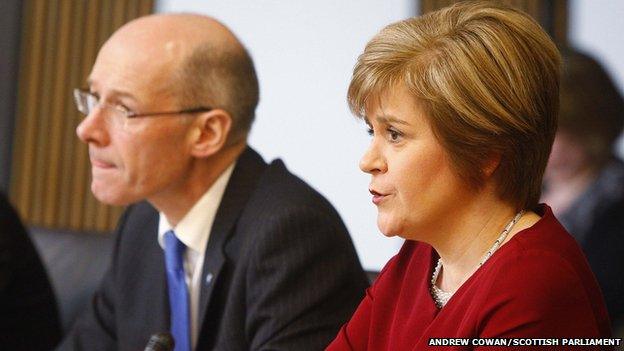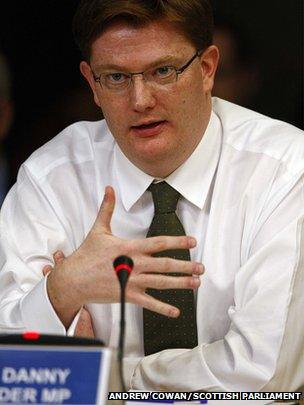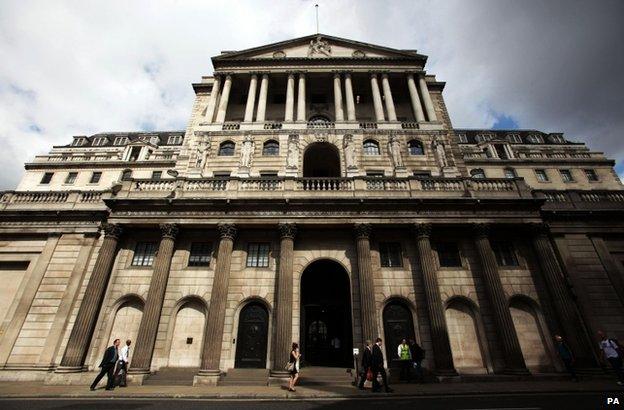Scottish independence: Danny Alexander's disarming frankness
- Published
On most matters, Danny Alexander was quite deliberately courting controversy with his comments to Holyrood's economy committee. Independence? It'll cost you.
But, on one topic at least, his disarming frankness probably prompted universal endorsement.
The context was Mr Alexander's insistence that a currency union would be vetoed by whichever politician ended up occupying Number 11 Downing Street after the next UK election.
That chancellor, he said, would be "either George Osborne, Ed Balls or, in a strange set of circumstances, myself!" The latter point was delivered with a broad grin.
(In the event of independence, of course, Mr Alexander, as a Scottish MP, would, after an interim period, be heading for the exit door at Westminster rather than the division lobby. His point dealt with that early phase, post referendum but pre independence.)
Right now, though, an entirely different set of circumstances - the UK coalition - have installed Mr Alexander as the Chief Secretary to Her Majesty's Treasury.

John Swinney and Nicola Sturgeon also appeared before the parliamentary committee
In that capacity, his mission was to explain what the Treasury believe to be the costs associated with independence.
In particular, he argued that borrowing costs would rise - especially if Scotland declined to accept a share of UK debt.
Now there is an intriguing technical point here.
The debt was piled up by the United Kingdom. It is the Treasury's contention that the remainder of the UK, sans Scotland, would be the continuing state, legally and in the eyes of the international community. Scotland would be seen as seceding.
Does that mean, then, that those accumulated debts should be met solely by the remainder of the UK, rUK?
Certainly, the Treasury has already announced that all such borrowing will be serviced by UK/rUK - whatever the outcome of the referendum and whatever deal is done on debt with a putative independent Scotland.
Mr Alexander said that was done to calm the markets.
But the chief secretary suggested those same markets would be distinctly spooked if Scotland steered clear of serving any proportion of UK debt.
He argued that financial markets would see that as analogous to defaulting on debt.
They would respond accordingly by affording Scotland a poor credit rating, thus hiking up the cost of borrowing.
One bank, he said, had estimated that, in such circumstances, the average annual cost of a mortgage in Scotland would rise by around £5,200.

Danny Alexander briefly pondered life as UK chancellor
At the outset, Mr Alexander had arrived bearing gifts. Or, more precisely, a consequence of the Scotland Act 2012 which enhances Holyrood's powers.
From next year, the Scottish government will be able to borrow up to £2.2bn per year for capital projects.
Following consultation, Mr Alexander announced that part of that sum can be raised by the Scottish government issuing bonds on global markets.
The accompanying news release noted that Treasury approval would be required before Scotland could issue bonds in any currency other than sterling.
Is it only me or, in the light of the past week, does that count as dry Mandarin drollery?
In response, John Swinney, the Scottish finance secretary, said thanks for the bond offer - but no thanks for the matching analysis.
There was no evidence, he said, that an independent Scotland would face higher borrowing costs. Comparable small countries, he said, faced lower bond charges than the UK.
And he cited expert opinion to the effect that it was impossible, legally, for Scotland to default on loans which had been accumulated by another state.
Mr Swinney stressed repeatedly that an independent Scotland would want to share the cost of servicing the UK's debts - but as part of a wider deal on issues such as the Bank of England and the currency.

Mr Swinney said an independent Scotland would want to share the cost of servicing the UK's debts
He suggested the Treasury could not have its cake and eat it too. (Although, presumably, in these austere days, there is an absence of gateau in Whitehall. Dry pemmican at best.)
If the UK insisted that rUK was the continuing state, with access to all assets, then they were landed with the liabilities too.
He suggested that rUK would be "walking into" an extra annual cost of around £5bn in servicing the total debt without Scottish assistance.
That, he said, added to higher transaction costs for rUK companies dealing with Scotland, created an incentive to do a deal on the currency.
Which brings us back to Mr Alexander's insistence that, in practice, such an outcome would rebound upon Scotland.
Which brings us back to Mr Swinney's contention that rUK would suffer.
Which brings us back to . . .